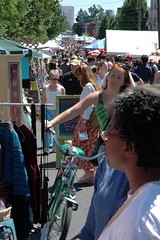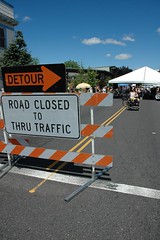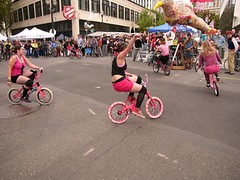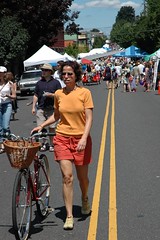[Editor’s note: This is the first article by new BikePortland.org contributor Elly Blue. Let’s give her a nice, warm welcome!]
Last month, I dropped by Last Thursday on Alberta to visit local artist Carye Bye. I was pedaling pretty slowly, gawking at the art, the oddly-dressed hipsters, the musicians, and the improbable bikes when someone in a car behind me honked their horn and I reluctantly sped up.
Then, Someone on a bike ahead of me swerved away from a car nosing its way through the intersection.
Carye was doing a brisk trade, but just starting to enjoy herself. It’s becoming increasingly stressful to set up her table, she said, due to competition for sidewalk space. Later, I walked a few blocks down the street and back, and could barely move through the claustrophobic crush of people squeezed together on the narrow sidewalk.
I had a vision—as I got back on my bike and cut down 29th—of the length of Alberta closed to cars, and opened up to people walking, biking, skateboarding, and rollerblading. I imagined more space for artists to display their wares, for people to roam in safety, and room for bigger, bolder happenings, like fire dancers, chalk drawings, and other creative endeavors.
Taking cars off the street so that you can make a fair or a party even more festive and safe doesn’t sound like a radical idea, and that’s exactly why it’s one of the most revolutionary possibilities out there.
Any summer weekend, you’re likely to happen upon several official or unofficial street closures for neighborhood block parties or
festivals. Anyone can apply for a street closure permit (here’s more information on the permit process).
The Mississippi Street Fair and Free Geek’s Geek Fair (on July 15th) are both carfree events. The Mississippi event even uses this as a selling point on their poster saying, “People only, closed to cars all day.”
Wouldn’t it be great if we had more carfree events?
Why shouldn’t the popular Peacock Lane holiday lights display have one night when you can go see them by foot and bike—but not by car?
Portland has had two Car Free Day street fairs in the past, but this year organizers decided to focus their efforts on more carfree events throughout the city instead of a one-day fair.
If we can educate the the community on the benefits of carfree days and the process of street closures, then every day could become Car Free Day—without the potentially alienating name.
Or maybe—this is another dream, but one I’m convinced can become reality—what if we could have one day where all of Portland could be freed from the traffic, smells, dangers, and noise created by private cars?
Bogota, Columbia under the visionary leadership of former mayor Enrique Penalosa has done it every year since 2000 to widely popular acclaim.

Photo: Institute for Transportation and Development Policy
It sounds counterintuitive, but when was the last time you rode your bike after 3am or before 7am? The roads are free, easy, open. People wave to each other, say hi, nod over coffee.
Even better, think back to the yearly snowstorms that essentially do the same thing in Portland. Remember how festive it is, with people walking to their local shops, cafes, and bars, greeting each other in the street, chatting with their neighbors, usually strangers, about the weather and their city? Imagine that, but without the inconveniences created by having no warning, or by dangerous road conditions. If we had months or weeks to make other arrangements for getting to work and running vital errands, a snow day would be a real holiday—the kind of day that builds community and makes people feel happy.
When you think of it that way, it only makes sense to try to and create more carfree days in Portland.
If you’d like to get involved in making more carfree events happen in Portland, I’m putting together a working group of like-minded folks to make this happen and I’d love to have you join us. Read more here or get in touch with me directly at eleanor[dot]blue[at]gmail[dot]com.
For more carfree information check out these links:





